Indonesia: from the old order to the new
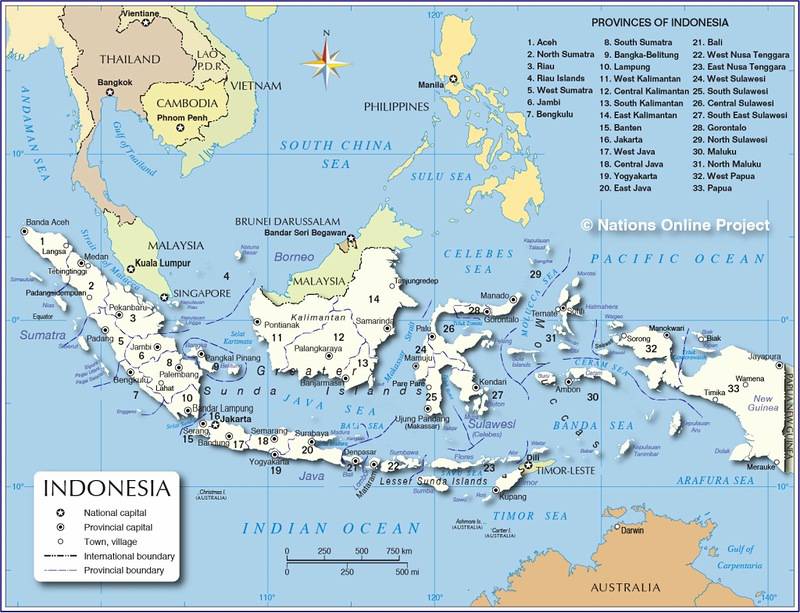
In the first half of the last century, the national liberation struggle began in Indonesia, directed against the colonial model of the state and dependence on Holland. One of the prominent leaders of this struggle was engineer Sukarno, a member of the National Party of Indonesia, who later came to power in the country and put his political ideas into practice. Already in 30, Sukarno was a fully formed national socialist - not in the German sense, but in the sense of being oriented toward a rather extreme Indonesian nationalism and a Soviet-like economy. Actually, the basic concepts of Indonesian nationalism were developed by Sukarno. He urged the judges who conducted his trial not to encroach on freedom of opinion and expression: “I’m sure the thought ...” It’s tempting to condemn the rebel just because he is your political opponent, ”doesn’t belong to the gentlemen judges”, however coming to power imposed strict censorship in the country and banned entire political parties. In general, Sukarno was a left-wing anti-colonial populist who repeatedly changed his mind and tried, without reducing the general ideological pathos, to conduct something like the Indonesian realpolitik.
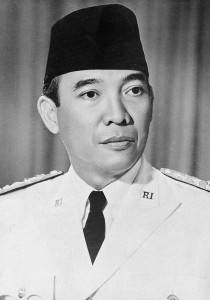 After a long struggle with Dutch influence, many years spent in custody, creating new parties and movements that did not achieve particular success, in 1950, Sukarno became the leader of the independent Unitary Republic of Indonesia. In general, he was guided by the loose concept of the “third way” sample - the economy under state administration, nepotism, the cooperative economy, and patriotism, nationalism, religiosity and the principles of Panchasila in social policy. Panchasila - "five principles" - includes
After a long struggle with Dutch influence, many years spent in custody, creating new parties and movements that did not achieve particular success, in 1950, Sukarno became the leader of the independent Unitary Republic of Indonesia. In general, he was guided by the loose concept of the “third way” sample - the economy under state administration, nepotism, the cooperative economy, and patriotism, nationalism, religiosity and the principles of Panchasila in social policy. Panchasila - "five principles" - includes1 monotheism;
2 fair and civilized humanity;
3 is the unity of the country based on Indonesian nationalism, which in practice meant rigid unitarism and centralism;
4 democracy in the format of public consensus, musyawarah;
5 social justice for all the people of Indonesia.
Panchasila - social doctrine. Politically, Panchasila was expressed through Nasakom. This abbreviation comes from the combination of the words NASionalisme (nationalism), Agama (religion) and KOMunisme (communism).
Sukarno's social concepts were so vague and unspecific that the military who overthrew him, who established the right dictatorship in 67, adopted the same ideological memes without changing a word in them - and successfully used them until the end of the 90s. Among the important Sukarnian national socialist ideologies can also be called "dharma eva hato hanti", which he understood as "Strength through unity, unity through strength," marhaenism, i.e. focus on the common people oppressed by foreign capital; as well as "gotong-rojong", "mutual aid". He understood democracy and national construction in the spirit of fascist futurists like Marinetti, and the Soviet “romantics of the screw and gear”: “The Indonesian people must mobilize all their energy, like a powerful machine powered by Panchasil’s spirit, like a coordination miracle. Each wheel should set in motion another a wheel, every cog should do its job absolutely unmistakably (...) Like a giant hive, the whole society should strive to implement the principle “one for all and all for one.” Sukarno after coming to power led censorship - prohibited American and European films, as well as a large number of books, especially the entertainment genre - Pulp, a detective, and so, citing the fact that international imperialism decomposes the original culture of Indonesia.
The economic sector could not be reformed by adopting vague concepts, so the government began to try different models. The first concepts were developed with the active participation of the country's vice-president Mohammed Hatt, who received an economic education in Holland. Hatta has long opposed Sukarno during the national liberation struggle, but later politicians reconciled and jointly carried out reforms in the country. The world, however, did not last long - in the 1956 year, Hatta resigned. He criticized Sukarno, calling him a dictator and later ceased any relationship with him.
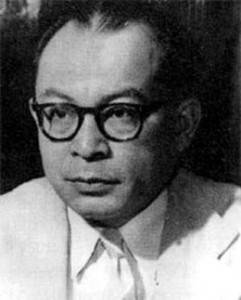 Extensive nationalizations were carried out in the country - the Dutch equity Javashe Bank was transformed into Bank Indonesia, the government bought most of the power plants, Garuda Indonesian Airways. By the way, the names of Sukarno and Hatta, which laid the foundation for the national Indonesian aviation, named the largest airport in the country - Bandar Udara Internasional Soekarno – Hatta. By nationalizing entire economic sectors, the state secured exclusive rights to certain branches of production: railways, airlines, nuclear energy, the defense industry, and the water supply system. Attempts were made to introduce an analogue of GOST - to create a number of state enterprises that produced standardized products and improved the goods produced by small craft organizations to the GOST state, but the plan worked poorly due to mass illiteracy and disinterest of the population. In 1949, the government adopted the Sumitro Plan, whose goal was to create priority market conditions for indigenous Indonesians and reduce the role of foreign capital in the country. National importers were granted subsidies and all kinds of concessions. The Benteng Plan was adopted, which regulated and distributed import rights for rare and scarce goods between companies that were at least 70% owned by indigenous Indonesians. However, this approach led to an incredible increase in corruption, most of the privileges were sold to foreigners, mainly to the Chinese. In 1957, when the failure of the program became apparent, it was officially curtailed. The government stopped building a “corporate agrarian state,” and moved on to the concept of controlled democracy, a controlled economy, and industrialization.
Extensive nationalizations were carried out in the country - the Dutch equity Javashe Bank was transformed into Bank Indonesia, the government bought most of the power plants, Garuda Indonesian Airways. By the way, the names of Sukarno and Hatta, which laid the foundation for the national Indonesian aviation, named the largest airport in the country - Bandar Udara Internasional Soekarno – Hatta. By nationalizing entire economic sectors, the state secured exclusive rights to certain branches of production: railways, airlines, nuclear energy, the defense industry, and the water supply system. Attempts were made to introduce an analogue of GOST - to create a number of state enterprises that produced standardized products and improved the goods produced by small craft organizations to the GOST state, but the plan worked poorly due to mass illiteracy and disinterest of the population. In 1949, the government adopted the Sumitro Plan, whose goal was to create priority market conditions for indigenous Indonesians and reduce the role of foreign capital in the country. National importers were granted subsidies and all kinds of concessions. The Benteng Plan was adopted, which regulated and distributed import rights for rare and scarce goods between companies that were at least 70% owned by indigenous Indonesians. However, this approach led to an incredible increase in corruption, most of the privileges were sold to foreigners, mainly to the Chinese. In 1957, when the failure of the program became apparent, it was officially curtailed. The government stopped building a “corporate agrarian state,” and moved on to the concept of controlled democracy, a controlled economy, and industrialization.The state, seeking to raise funds for the development of industry and the improvement of living standards, carried out additional nationalization. "The economic life of the nation will be directed, the economy of the nation will become a directed economy. With such a system ... all fixed assets should be owned by the state or, at least, be managed by it," Sukarno said. The radicalism of this political period could not be compared with 1950-1957. Sukarno’s extremely aggressive policy towards foreign companies and cultures was noted by many researchers, such as Frederick Bunnell. If earlier the government nationalized enterprises with indemnification of damage, or simply bought out shares from foreign owners, now nationalization went without any compensation. Over the next 13 years, Holland was almost completely driven out of the Indonesian economy. This gave some impetus to the development of primary education, national industry and medicine, but the results were still weak; In addition, the place of the Dutch was taken by the Chinese, and not by the Indonesian natives, which the government counted on. In an effort to rally the people, the government announced a confrontation with the young state of the Federation of Malaysia. She was declared an agent of Britain, and in the wake of anti-Malaysian sentiment, the government nationalized additional British and Malaysian enterprises. With the "protégé of British imperialism," all relations were broken, guerrilla groups were thrown on its territory. In 1965, Indonesia generally declared its control over all foreign enterprises - with the formal preservation of the rights of owners. It, however, did not guarantee anything special - it was located in Indonesia and remained in Indonesia.
All this led to an increase in inflation, breaks in established economic relations in the regions, a fall in the already low standard of living. Mass separatist speeches began, which were suppressed by force and distribution of funds to the regions, quite by the way, in the Soviet style of "buying loyalty." In addition to the suppression of separatism, the Indonesian national socialists managed to seize other countries - for example, West Irian. According to Sukarno, up to half of the whole Indonesian budget was spent on the military suppression of separatism and resistance of the occupied territories, the content of the expanding army and the “gifts” to the rebel regions. Taking into account the costs of planning and the activities of the government bureaucracy, 2 / 3 funds were withdrawn from the budget. The rest was sparingly spent on social needs and industrialization. With all this, the separatists periodically seized entire regions, formed their own governments - for example, the Revolutionary Government of the Republic of Indonesia. Some secessionist organizations, such as the Organisasi Papua Merdeka — the Free Papua Movement — continued to operate after the overthrow of Sukarno.
The concepts of the percussion building of socialism were rejected - now it was possible to arrive at the desired system only after a few eight-year percussion labor and total cooperation, fitting the "gears" and "cogs". At the same time, Sukarno insisted that the kepribadian, the “distinctiveness”, “originality” of the Indonesian path, be surely reflected in the new national idea, which was simply expressed in a demonstrative separation from the Chinese and Soviet models, including the transition from the five-year plans adopted earlier to eight years old. The new model was supported by the Communist Party of Indonesia, KPI.
The plan was extensive. He assumed the next strengthening of the planned ideology and its introduction into all spheres of public life. By 69, the year it was planned to provide the population with food and clothing within the framework of the sandang-pangan plan (which actually means “food-clothing”). On the agenda was the problem of education and medical care, which after a short awakening again fell into a coma. Sukarno insisted on agrarian reform.
All these plans, however, did not save the situation. In Indonesia, uncontrolled inflation began; agrarian reform spawned a surge of violence in the most backward regions and actually remained “on paper”, and all further chaotic decrees and plans, such as DEKON, designed to make the huge bureaucratic machine more flexible, only aggravated the situation. There was displeasure in the country both from the right (from the military, foreign owners, wealthy city dwellers, businessmen and conservative agrarian circles supporting separatist ideas) and to the left - Sukarno was actually criticized by all socialists who opposed the bureaucratization and militarization of the country. Old colleagues and friends of the party turned away from him. The slogan "Sukarno-1945 - yes, Sukarno-1966 - no!" Sounded everywhere.
In order to oppose the opposition by force, Sukarno decided to create a police force - this idea came to him after a meeting with Chinese Foreign Minister Zhou Enlai. Sukarno planned to call the Fifth Force militia and arm it with the help of China. The plans, however, did not come true.
On the night of September 30 on October 1 1965, a group of military pro-communist rebels killed six generals - members of the Indonesian General Staff, including Army Chief Ahmad Yani, and captured three more alive. The putschists seized key objects of Jakarta, incl. Radio building of the Republic of Indonesia, and transmitted information according to which the country was preparing a right-wing coup, scheduled for the fifth of October. The rebels reported that prominent figures of the state, such as General Nasution, head of the army, were among the counter-revolutionary coup leaders; Ruslan Abdulgani, diplomat and Minister of Foreign Affairs, who, by the way, helped Sukarno develop the concept of a "prolonged" transition to socialism, etc.
Solving the problem was taken by General Suharto, who, after the assassination of the commander-in-chief of the land forces by the putschists, Ahmad Yani, took command of the army, entered into negotiations with the rebels and forced them to surrender. It is important to say that the rebels made a number of blunders in coordinating the coup - they clearly counted on the rapid development of events and a quick victory. For example, the rebels did not provide the soldiers with provisions in Jakarta with provisions. They also did not bother to explain their goals, saying only that the troops were being introduced into the capital to protect President Sukarno. When "Sukarno's advocates" unexpectedly announced his dismissal from office and the transfer of power to the Revolutionary Council, and also canceled the military ranks of a rank higher than lieutenant colonel, the soldiers began to worry. Suharto could only say that the Communists use them in the dark to overthrow the legitimate president.
The speech of the coup, however, received some support. On the morning of October 1, shortly after Untung’s radio address, five of the seven divisions that were part of the Diponegoro division came under the control of the September 30 Movement. The mayor of Surakarta, a member of the Communist Party, spoke in support of the Movement. In Yogyakarta, rebels, led by Major Muljono, were abducted and later killed by the commander of the military district of Central Java, Brigadier General Katamso, and the head of his administration, Lieutenant Colonel Sugidzhono. However, after receiving the news of the defeat of the September 30 Movement in Jakarta, most of the rebels in Central Java laid down weapon.
The head of the rebels, Untung Shamsuri, denied his belonging to the Communists and said that the Movement acted on its own initiative, for patriotic reasons. He was sentenced to death.
This coup was the decisive point for socialist Indonesia. Sukarno actually lost power - although the military restored him as president, but he was forced to transfer the real power to the cabinet, and a year later to General Suharto, who officially closed the Nasakom doctrine and declared the era of Orde Baru - New Order. The country began the feverish creation of youth paramilitaries organizations, like Kesatuan Aksi Mahasiswa Indonesia - “Union of Students of Indonesia” and Pemuda Pancasila - Panchasila-youth. These movements very quickly moved from the tactics of street protests to the sweeps and massacres of communists in alliance with the Islamists and - in some regions - under the auspices of the army. Speaking about the participation of the military in the massacre, it should be noted that they helped the paramilitaries or even encouraged them not in all regions of the country. In some areas, the army behaved perplexedly and tried to sluggishly maintain order; in some, she was actively involved in the murder of the Communists. In this regard, I would like to recall the figure of Sarvo Edi, a radical Indonesian anti-communist, a prominent military figure who was particularly famous during the purges.
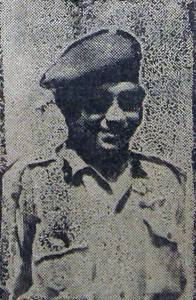 In addition to the hatred of the Communists, he had a personal reason - Sarvo Edi avenged Akhmad Yani, commander of the land forces, killed by the rebels from the 30 Movement of September. Jani was his friend and ally. As chief of staff of the elite unit Resimen Para Komando Angkatan Darat - paratrooped special forces of the Indonesian army, Sarvo Edi and his fighters killed tens of thousands of people in Java, Bali and Sumatra. He organized paramilitaries in the villages - later the Latin American ultra-right in Colombia, Guatemala, El Salvador and Brazil would widely "unleash" this practice. The head of the Indonesian special forces was an outstanding specialist in the field of non-traditional military methods and counter-terrorism work, and the network of anti-communist militants, created by him, worked as a streamlined machine.
In addition to the hatred of the Communists, he had a personal reason - Sarvo Edi avenged Akhmad Yani, commander of the land forces, killed by the rebels from the 30 Movement of September. Jani was his friend and ally. As chief of staff of the elite unit Resimen Para Komando Angkatan Darat - paratrooped special forces of the Indonesian army, Sarvo Edi and his fighters killed tens of thousands of people in Java, Bali and Sumatra. He organized paramilitaries in the villages - later the Latin American ultra-right in Colombia, Guatemala, El Salvador and Brazil would widely "unleash" this practice. The head of the Indonesian special forces was an outstanding specialist in the field of non-traditional military methods and counter-terrorism work, and the network of anti-communist militants, created by him, worked as a streamlined machine.Sarvo Edi stood out even among the far-right Indonesian military - he advocated the elimination of Sukarno, the tightening of terror and repression, and the complete eradication of communism in the country. In the days of Suharto, when the right was clearly perceived as the savior of the country, Sarvo Edi was condemned for being overly cruel and extreme. During the New Order, he criticized Suharto for overly soft politics, corruption, and loyalty to Sukarno’s legacy. Some hostility between Suharto and the paramilitary leader arose during the September 30 putsch. Sarvo Eddie asked Suharto where the generals who were abducted were, to which he indifferently replied: "Isn't such things (disappearances of people) normal during revolutions?" For a friend and ally of one of the killed generals, this was quite unpleasant to hear.
The head of state kept the irreconcilable radical away from big politics. Sarvo Edie was transferred to Sumatra, then - to suppress the separatists in New Guinea, sent as ambassador to South Korea, put the head of the Academy of the armed forces of Indonesia. In 1987, however, he was elected deputy to parliament, but in 1988, he resigned in protest at the appointment of Vice-President (and as Suharto’s successor was supposed to be) General Sudarmono.
It is curious that Sarvo Edi developed a social concept close to the ideas of Spanish fanagists and Chilean gremalists. He believed that political parties should be liquidated and replaced by public "factions" aimed not at political activity, but at economic development.
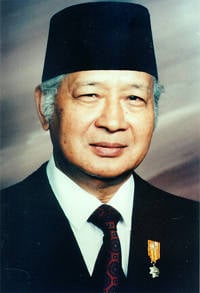 In 1967, General Suharto became Acting the country's president on the orders of Sukarno, and in 1968-m - the official president. His economic policy was very different from the Stalinist style of the predecessor. It was called the "economic democracy", and suggested a strong unwinding of the nuts and the restoration of normal relations with foreign capital. Government control over foreign companies was abolished; the state, however, kept the national monopoly in the fields of atomic energy, airlines, media, railway, water supply, shipping and telecommunications.
In 1967, General Suharto became Acting the country's president on the orders of Sukarno, and in 1968-m - the official president. His economic policy was very different from the Stalinist style of the predecessor. It was called the "economic democracy", and suggested a strong unwinding of the nuts and the restoration of normal relations with foreign capital. Government control over foreign companies was abolished; the state, however, kept the national monopoly in the fields of atomic energy, airlines, media, railway, water supply, shipping and telecommunications.Suharto worked with a team of pro economists who got the nickname The Berkeley mafia "Berkeley Mafia". They were the ones who developed the economic concepts for the Orde Baru regime. Many critics of the New Order, citing the shock doctrine of Naomi Klein, argue that the Mafiosi were identical with Pinochet's Chicago Boys. This is quite an illiterate statement: the "mafiosi" were an order of magnitude to the left of the ultra-right "Chicagoans," and in the West the Berkleites were always qualified as "economic nationalists." The Chicago Boys, however, were more famous for their “libertarian” approach, with amendments to Greekism. It is important to add that among Berklyans there were also very specific people, such as an agrarian, a nationalist, and a developer of the concept of the "Panchasila economy", Professor Mubiarto. Those. The Berklyans were a moderately right-wing technocratic group, inclined to jointly seek a compromise and protect the Indonesian economy, and not the "Chicagoans" of the local spill.
The group headed by Sukhartov economists was Professor Vijoyo Nitisastro. He and his people developed the Program for Stabilizing the Economy and Curbing Inflation - and implemented it by 1969, providing a country with a painless way out of the crisis.
The Indonesian government pledged not to carry out nationalizations and guaranteed the protection of foreign capital from encroachment. Suharto, in spite of all this, was in no hurry to abandon planning: central administrative bodies, such as Bappenas and Biro Perankangan, engaged in the development of projects for socio-economic development, continued to work.
Suharto focused on improving the lives of citizens, raising the country's international status, overcoming poverty and self-sufficiency in Indonesia’s food. He approached the implementation of this plan comprehensively. To restore and improve communication between different parts of the country, the Logistics Bureau was established - BULOG. In the most densely populated regions of the country, the programs of the newly formed Family Planning Institute operated. Suharto was able to significantly slow down the growth of the country's population: from 2.5% per year to 1.5% in 90. Urbanization was carried out. However, the government was not in a hurry to "turn off the village." The Indonesian village was the place where the workers returned after the completion of seasonal work in the city. Large amounts of money were invested in development, technical support, and the program for the development of plantation agriculture, and as a result they paid for themselves thanks to peasant farms integrated into the network of Perkebunan inti rakyat — central people's plantations.
These measures have caused strong discontent among Islamic circles, who expected to become the basis of the New Order. Suharto, however, preferred to rely on military circles and professional economists. Even more discontent Islamists caused the cultural program of the government. Censorship on Western films and books was abolished. Suharto, however, was not a liberal. He simply reoriented censorship from the West to the East - all newspapers in Chinese, except one, and most of the Chinese schools were closed. However, the Indonesian media system already under Suharto became quite diverse; now the Indonesian media is the freest and most “open” in Asia. Then began active attempts to create their own cinematography, focused on Western samples and the Hong Kong Film School. Sukarno and the regime of the Old Order were staged in national and regional theaters.
The task was very difficult - to bring the national cinema at least at the level of Bollywood and Hong Kong. Make it happen - at least, Bollywood Indonesia caught up. A distinctive and extremely prolific Indonesian film school has appeared in the country, working mainly in the genre of action movie, horror film and drama. With all the unusual Indonesian products, it is very comfortable for the viewer, who is used to Western products. Among the connoisseurs of operational cinema, Indonesian things are valued rather highly, and films like “Mystique in Bali”, “Lady Terminator”, etc., generally refer to unconditional masterpieces. They, by the way, are very famous in the USA. These films are constantly condemned by the Islamists for "depravity" (usually the main characters there are beautiful, half-naked girls, leading a completely non-conservative lifestyle).
The issue of women's rights under Suharto can be interpreted in different ways. On the one hand, in words he was a supporter of the traditional family, conservative households and "strong morality." On the other hand, he strongly encouraged the development of advanced cinema, women's media, contributed to the development of the family planning institute, and the fact that during his reign the image of an independent woman of “modern type” became very popular, says Susan Brenner’s article “On the Public Intimacy of the New order: images of women in popular Indonesian print media. "
Modern Indonesia remains a rather corrupt country, but there is already very strong freedom of expression, there are many human rights organizations involved in investigating the crimes of 1965-1966. The country has a powerful left-wing opposition to Sukarnov’s and Social Democratic orientation: parties such as PDI-P, the “daughter” of the Indonesian National Party, are gaining up to 40% in regional elections and have a solid political weight. There are also smaller left-wing parties, such as Partai Hanura or Gerindra, who gain 5 - 6% in elections. They are still to the left of the PDI-P and are also in opposition.
The generally accepted opinion about the conflict of the New and Old order and mass repressions in the major cities of the country is as follows: Sukarno was unbearable, it should be removed, repression was unnecessary and caused great trauma to the whole nation. How everything was in reality - we just have to find out when the Indonesian archives will be opened.
Information